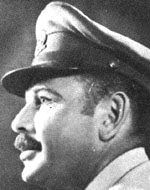Son of Yerachmiel and Hannah. He was born on October 16, 1930 in Glatz, Romania. He immigrated to Israel in 1948. Until the outbreak of the Second World War, he attended school as a regular child, but after he broke out, he was forced to go to work to help support the family. He joined the Betar youth movement after the war. Where he met his girlfriend, Nelly, nee Katz, in December 1947. In December 1947, they boarded the Pan York ship that sailed to Israel, and the ship was deported to Cyprus, where they were not married in Israel. Yaakov and his wife came to Israel for a short period of time and stayed in an immigrants’ home and worked in the orchards of the Sharon. Bode port. Jacob was drafted in November 1948 after the army and short duration-training officer was assigned to the city of Haifa. He was particularly prominent in the welfare field, which was close to his Lev. Thanks to his talent, he was asked to remain in the permanent army, and he accepted the request. After completing nine years of service, the Haifa city officer moved to serve as a management officer in the Nazareth administration and later served as a liaison officer in the Acre bloc. In 1961 he was appointed as a city officer in Nahariya. Jacob was a dedicated and loyal family man. In 1962, the family, which in the meantime had grown to five, moved to Nahariya. As the harvest of the city of Nahariya, Jacob was a familiar figure. Respectful and proud of the city’s leaders and residents. His office door was always open. Patience and an ear are familiar to every person, and a great willingness to help, facilitate – all characterized him as a person and as a city officer. In this capacity, he passed the Yom Kippur War and before it the Six-Day War and the wars of attrition between and after them. In these difficult times, Jacob devoted all his energies to dealing with bereaved families. He spared no effort to dine them and help them get back on track. Shared grief and suffering for the injury or fall of every soldier and soldier, but never betrayed his own pain, lest he be undermined by the support he sought to serve those who needed it. Despite the bitter reality, Jacob always had an air of joy and joy of life. All the suffering he kept in his Lev, until he could not bear the heavy burden. On February 3, 1979, Yaakov fell in the military cemetery in Nahariya, leaving behind a wife, two sons and a daughter. “We saw a cliff before us, placing a hand on Nablus,” he said in front of his grave Which is open to Yad Labanim in the Western Galilee. In a few conversations we had one told him, ‘The Yom Kippur War will finish me,’ and for the few who said this, it was clear that he was investing all the fiber of his Lev and soul as a faithful steward of the bereaved family. The possibility of arresting him, we saw how his Lev was betraying him and we saw him kneeling and walking away from us. ” In a letter of condolence to the bereaved family, the Haifa city officer wrote: “As an officer, he was an outstanding officer with a great sense of awareness and devotion to his position, which he filled with great success and dedicated to him the most Yaffa hours of his life. The Chief Rabbi of the IDF, the rabbi of his beloved city, Nahariya, the mayor of Nahariya and the chairman of Yad Labanim, was worthy of all that is said in these eulogies. And his nights were dedicated to the public, which served with love and devotion, and was there in Nahariya, in its vicinity and in the entire Western Galilee. To all those who approached him. ” In his life, too, there were expressions of appreciation for his work. The letters of thanks they received were collected and kept in a special file. One of them wrote a bereaved father: “DaughterThis difficult fund to this day, three months after the disaster, I would like to mention the dedicated treatment of Nahariya city officer, Mr. Leibowitz Yaakov, who not only served as our assistant but especially helped us in matters that I felt were above his normal position. ” The bereaved family wrote to Yaakov: “We understand that the work you are working on is perhaps the most difficult one an IDF soldier can face, and as long as the state of the state is such, there is no escape from sorrow and grief. Sensitive, understanding and knowledgeable and tactful like you. I have no doubt that the fact that you dealt with the matter made it easier for us to take the difficult moments. “Some sacrificed one shot and others sacrificed their lives in a moment, bravely, in one battle, sacrificing himself daily and hourly, The most terrible of all, the bereavement, during his lifetime he worked for bereaved families, fell as another space of Israel’s wars, a space of many battles together.
